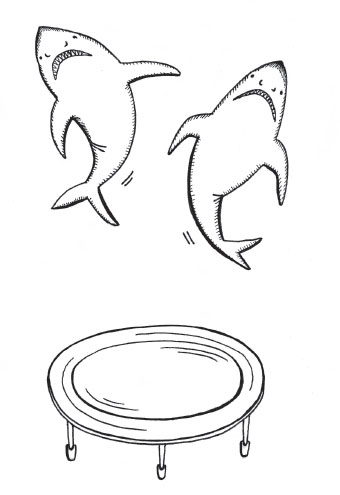


Literature should be my staff
but not my crutch
(Scott: Lockhart’s Life 1830)
There’s little doubt that as a culture we have a passion for a good story well told:
anecdotard (1894) an old man given to telling stories
ackamarackus (US slang 1934) a specious, characteristically involved tale that seeks to convince by bluff
SHAZAM (1940) Solomon’s wisdom, Hercules’ strength, Atlas’s stamina, Zeus’s power, Achilles’ courage and Mercury’s speed (an acronymic magic word like ‘abracadabra’ used to introduce an extraordinary story)
shark-jump (US media jargon 1997) instances that signal the imminent decline of a TV series by introducing plot twists inconsistent with the previous plot
bridges, bridges! (c.1880) a cry to arrest a long-winded story
Poetry too seems to be in the blood, and judging by the activity in pubs around the nation, in no danger of declining:
genethliacon (1589) a poem written for someone’s birthday
amphigory (1809) a poem that seems profound but is nonsense
randle (b.1811) a set of nonsensical verses, repeated in Ireland by schoolboys and young people, who have been guilty of breaking wind backwards before their companions
rhapsodomancy (1727) fortunetelling by picking a passage of poetry at random
musophobist (Swinburne 1880) a person who regards poetry with suspicious dislike

Scribblers still throng a land where people have long been under the illusion that there is something glamorous about the business of writing:
purlicue (1808) a dash or flourish at the end of a written word
wegotism (1797) the excessive use of ‘we’ in writing (particularly in newspaper editorials)
parisology (1846) the use of ambiguous language or evasive writing
macaronic (1638) mixing words from different languages
Patavinity (1607) the use of local slang or expressions when writing
cloak-father (c.1639) a pretended author whose name is put forth to conceal the real author
The best advice for authors is Somerset Maugham’s: ‘Don’t read your reviews, dear boy. Measure them’…
Zoilist (1594) a critic, especially one who is unduly severe or who takes joy in faultfinding (after the fourth-century Greek critic)
histriomastix (Tudor–Stuart) a severe critic of playwrights
squabash (1818) to crush with criticism
praise sandwich (US slang Houston 1987) criticism prefaced by and followed by compliments
There remains one important group that no one in the business can afford to take for granted – the dear old readers:
enchiridion (Late Latin 1541) a book carried in the hand for reference
thumbscall (Shropshire) a piece of paper or card inserted in a book to mark a page
bibliotaph (1824) a person keeping his or her books secret or locked up
grille-peerer (1940s) one of a group of clergymen who used to haunt the stacks of the London Library to look up the skirts of women browsing above
to have a face-ticket (British Museum Reading Room 1909) to be so well known to the janitors that one is not asked to present one’s ticket
Sitting in a corner with a mere book has never been enough for another creative group who flourish in our supposedly inhibited culture:
oyster part an actor who appears and speaks or acts only once (like an oyster he opens but once)
nap-nix (c.1860) an amateur playing minor parts for experience
crawk (1930s) a performer acting as an animal imitator
cabotinage (1894) behaviour typical of a second-rate actor or strolling player, implying a tendency to play to the gallery or overact
come back Tuesday pseudo-friendly advice from theatrical directors and management to hopefuls really meaning ‘go away!’
flag-fallen (16C) unemployed (used first of actors: the playhouse flag was lowered where there was no performance)
Many are the tricks of the trade to be learnt in this most demanding of callings; and theatre has developed a fine jargon to describe it:
swallow the cackle to learn a part
ping to speak one’s lines softly, with no special emphasis
pong to speak in blank verse after forgetting one’s lines
stagger the first rehearsal without a script in one’s hands
wing to fasten one’s script to one of the wing flats or some part of the scenery when one has failed to learn it properly and thus needs an occasional reference during the performance
Mummerset (J. B. Priestley: Festival at Farbridge 1951) fake peasant accents adopted by actors to denote a supposed rural origin (from a mix of Somerset and mummer)
Normal costume apart, a range of cunning accessories assist the thespian’s art:
heart the padding out of their tights by acrobats, actors etc. to prevent an otherwise painful fall
wafters (Geordie) swords made with blunt edges for performers
bronteon (Ancient Greek 1849) a device used in theatre or movies to create thunder
scruto (1853) a spring trap-door, flush with the floor of a stage, for a ghost to rise through, for sudden falls and other effects
pepper’s ghost a trick used to create a ‘ghost’ on stage by using an inclined sheet of plate glass onto which an actor can be projected as if ‘walking through air’
bird’s nest crepe wool used to construct false beards

But once you’re out there, darling, all you can do is stick to the script and hope for the best:
ventilator a play so appallingly bad that the audience leaves well before the final curtain, and their seats are filled only with fresh air
exsibilation (1640) the collective hisses of a disapproving audience
handcuffed an actor’s description of an audience who will not applaud
stiff (1930s) a terrible joke, rewarded only by silence
soso (1930s) a joke rewarded by a smile, but not a laugh
gravy easy laughs from a friendly audience
crack the monica (music hall jargon c.1860) to ring the bell to summon a performer to reappear
Though you may be deep into your role, you’ll still have one eye on the view beyond the footlights:
plush family empty seats in the auditorium (i.e. the plush-covered seats that can be seen from the stage)
paper the house to give away free theatre tickets in order to fill up an undersubscribed performance
whiskey seats seats on the aisle (popular both with critics, who need to get out before the rush and phone in their reviews, and those who like to escape to the bar when the action palls)
baskets are in a full house (from the one-time practice of leaving the prop baskets as security against the income of a touring company: if the house didn’t guarantee the payment of the theatre’s rent, the props were theoretically forfeit)
But let’s please never forget that the stage is not simply a venue for actors. Other fine artists offer equally enjoyable entertainment:
burn (conjuring jargon) staring at the magician’s hands without averting your gaze, no matter what misdirection is thrown
riffle (conjuring jargon) to let cards come out of the hand, creating a noise
grimoire (French 1849) a magician’s manual of black magic for invoking demons
cultrivorous (1846) actual or illusory knife-swallowing
drollic (1743) pertaining to a puppet show
swazzle (1942) a mouthpiece used by a puppeteer to make the squeaking voice of Mr Punch
Other performers don’t even need a stage. From break to Morris dance, a pavement or floor is more than enough:
gaff a dancer’s belt, the protection under his tights for his genitals
garlic (17C) a lively jig
applejack (1980s) a basic move to challenge another breakdancer to a competition, squatting down, falling back onto your hands, and kicking one leg high in the air, then springing back onto both legs
whiffler the man with the whip in Morris dancing
Singers, too, can operate anywhere:
griddle (b.1851) to sing in the streets
woodshedding (1976) spontaneous barbershop singing (originally meaning a place to rehearse music privately)
barcarole (French 1779) a gondolier’s song
rumbelow (1315) a meaningless song or refrain sung by sailors while rowing a boat (e.g. Heave Ho or Hey-Ho)
aubade (Franco-Provençal 1678) a song at sunrise
scolion (Ancient Greek 1603) a song sung in turn by the guests at a banquet
Though why be a busker when you could be a star? Or at least get as near to one as possible…
guerrilla gig a performance by a band in an unlikely venue, where they play until they are evicted
mosh to engage in uninhibited, frenzied activities with others near the stage at a rock concert (mosh pit the place near the stage at a rock concert where moshing occurs)
wollyhumper a bouncer employed by a rock band to make sure no fans manage to climb on stage while they play or, if they have climbed up, to throw them down again
résumé on a rope a backstage pass
woodpecker people who nod their heads to the music being played while paying no attention
There is one contemporary venue where almost all performers are happy to be seen; and behind the scenes in TV land, too, a whole rich lingo has grown up:
toss in television news, an onscreen handover from one host to another
golden rolodex the small handful of experts who are always quoted in news stories and asked to be guests on discussion shows
bambi someone who freezes in front of the camera (like a deer caught in headlights)
clambake the possibility of two or three commentators all talking over each other and thus confusing listeners
goldfishing one politician talking inaudibly in an interview (you can see his lips move but only hear the reporter’s words)